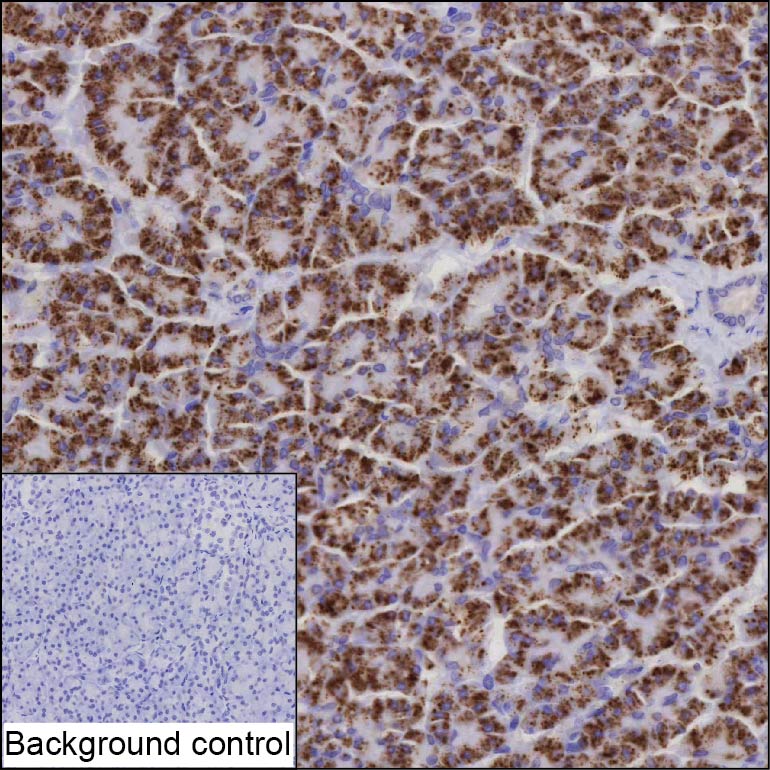
| WB | 咨询技术 | Human,Mouse,Rat |
| IF | 咨询技术 | Human,Mouse,Rat |
| IHC | 1/25-1/200 | Human,Mouse,Rat |
| ICC | 技术咨询 | Human,Mouse,Rat |
| FCM | 咨询技术 | Human,Mouse,Rat |
| Elisa | 咨询技术 | Human,Mouse,Rat |
| Host/Isotype | Mouse IgG2a |
| Antibody Type | Primary antibody |
| Storage | Store at 4°C short term. Aliquot and store at -20°C long term. Avoid freeze/thaw cycles. |
| Species Reactivity | Human |
| Immunogen | Purified recombinant fragment of human RIPK3 |
| Formulation | Purified antibody in PBS with 0.05% sodium azide |
+ +
以下是3篇关于RIPK3抗体的参考文献,涵盖其在细胞死亡机制和疾病研究中的应用:
---
1. **文献名称**:*RIPK3 deficiency or catalytically inactive RIPK1 provides greater benefit than MLKL deficiency in mouse models of inflammation and tissue injury*
**作者**:Newton, K. et al.
**摘要**:该研究通过基因敲除模型和RIPK3特异性抗体,揭示了RIPK3依赖的坏死性凋亡在炎症性疾病中的作用,并比较了不同信号分子缺失对组织损伤的影响。抗体用于验证蛋白表达及信号通路激活。
---
2. **文献名称**:*The Necroptosis Adaptor RIPK3 Promotes Injury-Induced Cytokine Expression and Tissue Repair*
**作者**:Moriwaki, K., & Chan, F.K.
**摘要**:利用RIPK3抗体进行免疫印迹和免疫组化分析,研究发现RIPK3不仅介导坏死性凋亡,还通过调控细胞因子表达参与组织修复,揭示了其在生理性修复与病理性损伤中的双重作用。
---
3. **文献名称**:*RIPK3 Critically Regulates MyD88-Mediated Proinflammatory Cytokine Production*
**作者**:Kaiser, W.J. et al.
**摘要**:通过RIPK3抗体阻断实验,该文献证明RIPK3在TLR/MyD88信号通路中调控炎症因子产生,独立于其坏死性凋亡功能,为抗感染免疫机制提供了新视角。
---
以上研究均依赖RIPK3抗体进行蛋白检测或功能验证,涉及炎症、感染及组织损伤等模型。如需具体实验方法或更多文献,可进一步补充说明。
The Receptor-Interacting Protein Kinase 3 (RIPK3) antibody is a critical tool for studying necroptosis, a regulated form of inflammatory cell death distinct from apoptosis. RIPK3. a serine/threonine kinase, acts as a central mediator in this pathway. Upon activation by upstream signals (e.g., TNF receptor family ligands or pathogen sensors), RIPK3 forms a necrosome complex with RIPK1 or other adaptors, leading to phosphorylation of the pseudokinase MLKL. This triggers MLKL oligomerization, membrane permeabilization, and eventual cell rupture, releasing DAMPs that promote inflammation. Dysregulated necroptosis is implicated in pathologies including inflammatory diseases, neurodegeneration, and cancer.
RIPK3 antibodies are widely used to detect RIPK3 expression, localization, and post-translational modifications in tissues or cultured cells via techniques like Western blot, immunohistochemistry, or immunofluorescence. They also aid in elucidating RIPK3's role in disease models and therapeutic contexts, such as evaluating inhibitors targeting the necroptosis pathway. However, antibody specificity remains a concern due to homology between RIPK family members and variable expression levels across cell types. Recent studies also highlight RIPK3's non-necroptotic roles in apoptosis, inflammasome activation, and metabolic signaling, expanding its research relevance. Validated RIPK3 antibodies are thus essential for advancing understanding of cell death mechanisms and their clinical implications.
×